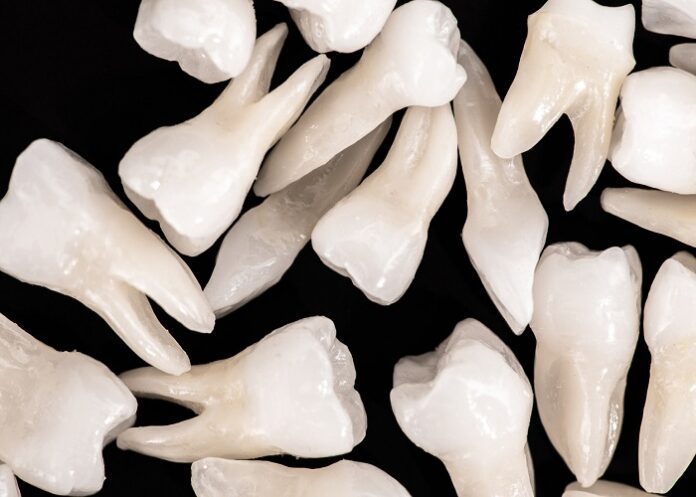Teeth grown in a lab could soon end the need for implants and dentures, experts say, after their study showing that cells from wisdom teeth, combined with pig teeth cells, can be cultivated in a lab and implanted to fill a gap left by a lost tooth.
These lab-grown teeth could be used to replace any type of tooth within 20 years, according to Professor Pamela Yelick, a professor of orthodontics at Tufts University in Boston.
And she is “100% convinced” that regenerating human teeth can happen, she told delegates at the recent American Association for the Advancement of Science (AAAS) annual conference.
“I believe we can do this in my lifetime, and I’m in my mid-60s. There are so many advances happening in technology, tissue engineering, regenerative medicine and dentistry, and they all feed off each other.”
The Telegraph reports that in a recent study by Yelick, published in the Stem Cells Translational Medicine journal, human-like teeth were grown in pigs in under four months.
The scientists believe that in future it will be possible to use only human cells to make new teeth for people.
“The study presented here validates a potentially clinically relevant bioengineered tooth replacement therapy for eventual use in humans,” the authors write in the paper.
Half of Britons are missing at least 10 teeth by the age of 75, according to official data, and one in 10 adults have fillings, crowns or bridges that cause discomfort.
Yelick said lab-grown teeth would feel more natural than implants because they keep the nerves and blood circulation.
“We use cells from wisdom teeth that need to be extracted, and then expand them in the lab to tens of millions of cells. Then we can put them on to biodegradable scaffolds and get them to form tooth tissue.
“Even after taking the cells out, freezing them, thawing them and putting them back together they still remember what to do and how to form little tiny teeth.”
The lab begins their growing process before the teeth then continue to grow into their full shape and size in the recipient’s gum.
Yelick has now founded a company to turn her scientific breakthroughs into a commercial reality.
Regendodent, the Boston-based company, has already developed one product, RegendoGEL, which is a naturally grown tooth pulp that can be implanted in a root canal.
Because it has not been cleared by the FDA, it is not yet commercially available in the United States.
The product is designed to make root canals last longer than their current lifespan because the standard cement that goes into the hollowed-out root is replaced with a natural tooth pulp.
That pulp is a combination of nerves and blood vessels that promotes continued root development.
Yelick added: “We’re hoping to make tooth roots that you could put a crown on that would fit properly with your bite.
“It might be resistant to caries or periodontitis so they could be therapeutic in addition to being functional. We’re really thinking big.”
Study details
In vivo bioengineered tooth formation using decellularised tooth bud extracellular matrix scaffolds
Weibo Zhang, Pamela C Yelick.
Published in Stem Cells Translational Medicine on 27 December 2025
Abstract
The use of dental implants to replace lost or damaged teeth has become increasingly widespread due to their reported high survival and success rates. In reality, the long-term survival of dental implants remains a health concern, based on their short-term predicted survival of ~15 years, significant potential for jawbone resorption, and risk of peri-implantitis. The ability to create functional bioengineered teeth, composed of living tissues with properties similar to those of natural teeth, would be a significant improvement over currently used synthetic titanium implants. To address this possibility, our research has focused on creating biological tooth substitutes. The study presented here validates a potentially clinically relevant bioengineered tooth replacement therapy for eventual use in humans. We created bioengineered tooth buds by seeding decellularized tooth bud (dTB) extracellular matrix (ECM) scaffolds with human dental pulp cells, porcine tooth bud-derived dental epithelial cells, and human umbilical vein endothelial cells. The resulting bioengineered tooth bud constructs were implanted in the mandibles of adult Yucatan minipigs and grown for 2 or 4 months. We observed the formation of tooth-like tissues, including tooth-supporting periodontal ligament tissues, in cell-seeded dTB ECM constructs. This preclinical translational study validates this approach as a potential clinically relevant alternative to currently used dental implants.
See more from MedicalBrief archives:
Wearing dentures may negatively affect nutritional intake – US study
Cavity-prevention approach effectively reduces decay

